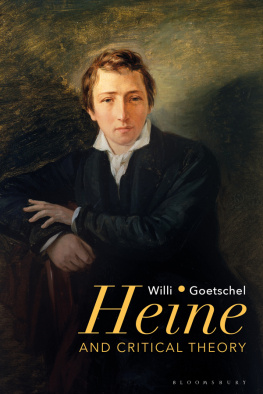
First published 1971 by Transaction Publishers
Published 2017 by Routledge
2 Park Square, Milton Park, Abingdon, Oxon OX14 4RN
711 Third Avenue, New York, NY 10017, USA
Routledge is an imprint of the Taylor & Francis Group, an informa business
Copyright 1971 by Patricke Johns Heine.
All rights reserved. No part of this book may be reprinted or reproduced or utilised in any form or by any electronic, mechanical, or other means, now known or hereafter invented, including photocopying and recording, or in any information storage or retrieval system, without permission in writing from the publishers.
Notice:
Product or corporate names may be trademarks or registered trademarks, and are used only for identification and explanation without intent to infringe.
Library of Congress Catalog Number: 2007025977
Library of Congress Cataloging-in-Publication Data
Heine, Patricke Johns.
Personality in social theory / Patricke Johns Heine,
p. cm.
Originally published: Chicago : Aldine Pub. Co., [1971].
Includes bibliographical references and index.
ISBN 978-0-202-36165-9
1. Social psychology. 2. Social role. I. Title.
HM1033.H45 2007
302. 15dc22
2007025977
ISBN 13: 978-0-202-36165-9 (pbk)
Contents
It is characteristic of members of a scientific discipline to pursue their interests as if they exist in splendid isolation from any other body of knowledge. Universities have fostered this conceit by departmentalizing the faculty and, thereby, adding organizational barriers to such weak ecumenical impulses as might exist.
Despite the occasional excitement generated by members of adjacent disciplines who meet at the border to discuss common interests, the situation in the social sciences has not changed substantially since they, one by one, escaped from the embrace of philosophers. Despite Lewins repeated assertion decades ago that B = f (PE), psychologists concerned with personality have managed to avoid coming to grips with E and sociologists have given little credence to Ps role in social process.
In consequence, psychologists have an unenviable record in their attempts to demonstrate the predictive validity of their measures of personality, because individuals are remarkably responsive to their social milieu, while sociologists have found that both prediction and induction of social change often fail because individuals do not do what they are, theoretically, supposed to do.
As the author demonstrates, if the concept B = f (PE) is realized at all, it is in the area of social psychology. Yet even in this area of convergence of interest, endeavors are not fully collaborative. Psychologists and sociologists each endorse their own brand of social psychology and, while there are increasing numbers of double-jointed professionals who are acceptable to both camps, their influence in the heartland of the two social sciences is not conspicuous.
Therefore, one goal in publishing this book is to expand the interest of future psychologists and sociologists in a fruitful integration of the study of individual behavior and the social milieu in which behavior occurs. For example, major steps might be taken in solving the criterion problem in personality research if it were possible to adduce reliable and valid measures of role performance. On the other hand, some predictions based on sociological research might be sharpened if sampling were based on a respondents subjective perception of his status, mobility, and of the opportunities and rewards available to him. The assessment specialist is dismayed when ascribed personality characteristics seem to lack durability across situations; the social planner is dismayed because significant numbers of individuals in a particular social category often behave in a manner seemingly contrary to their self-interest. Surely one constructive approach to the resolution of these dilemmas is a closer look at the problem of personality in sociology.
Psychologists are now venturing into the community with the view of studying (and intervening in) the effects on personality of the social environments in which individuals live, work, and play. Thus there is a clear need for a framework and a vocabulary for cogently examining the problem of the social experience in personality theory. Since it is doubtful whether any comprehensive and yet coherent review of this topic can be said to exist, perhaps this book will move some reader to undertake that difficult but necessary task.
Ralph W. Heine
The problem of personality, like many other borderline issues, falls within the province called social psychology. Presumably it is a problem neither to sociology (which functions at one level, it is said) nor to psychology (which allegedly functions at another). It is merely a problem when we try to harmonize the spheres. Then we recognize it as the only problem in social psychology, wonderfully disguised by the many shapes and forms its controversies have assumed over time. Here, therefore, the relation of the individual to the groupold territory to the social psychologistis approached through social definititions of person and personality.
The distinctive sociological contributions to the field are usually proclaimed to be role theory, role analysis, and role research and essentially this essay is about the rise and decline of that small edifice. is a review of critical developments that make role analysis something less than eternal in time and place, and something less than fully satisfying in social thought and theory.
The present text grew out of a briefer discussion, The Problem of Personality in Sociological Theory, published in Wepman and Heine, Concepts of Personality, Aldine, 1963. Now, as then, I am deeply grateful to the editor, Ralph Heine, for suggestions, criticisms, and encouragement. To Robert Wesner of Aldine I should like to say special thanks for his reading of the manuscript and his intelligent guidance in certain matters of content and organization. Finally, I should like to add an appreciation of an old teacher whose influence was, as the saying goes, formativeHans H. Gerth of the University of Wisconsin.
Introduction
There has long been debate about self, person, or individuality that we have come to recognize as a crisis of modern times. Since it is our fashion to call philosophic problems that are either poorly formulated or inadequately resolved by empirical investigation, certain inherent difficulties that beset a would-be science of personality may be considered philosophic. To label these as philosophic, logical, or empirical, however, hardly matters, for they may be expressed in any of these terms.
Let us begin with the last first. The exaltation of the individual and his individualityreligiously, as individual soul, politically as individual citizen, economically as rational man, psychologically as unique personhas been accompanied, in our world, by a steady increase in mere numbers of people. Even if we regard these two historic happenings as fortuitously accompanying each other in time, we cannot avoid noting a certain disharmony between the rise of the individual and the enormous growth of modern populations. Very simply: large numbers of people stand as a denial to the singularity or significance of any one person. Hence from the beginning we might well ask the naive question of where the individual comes in, what he counts for in a world steadily numbering more and more people, and what does being individual signify? In the modern world, we know that numbers count: actuarial truths have sup-planted knowledge, and probability statements have replaced scientific verities.










